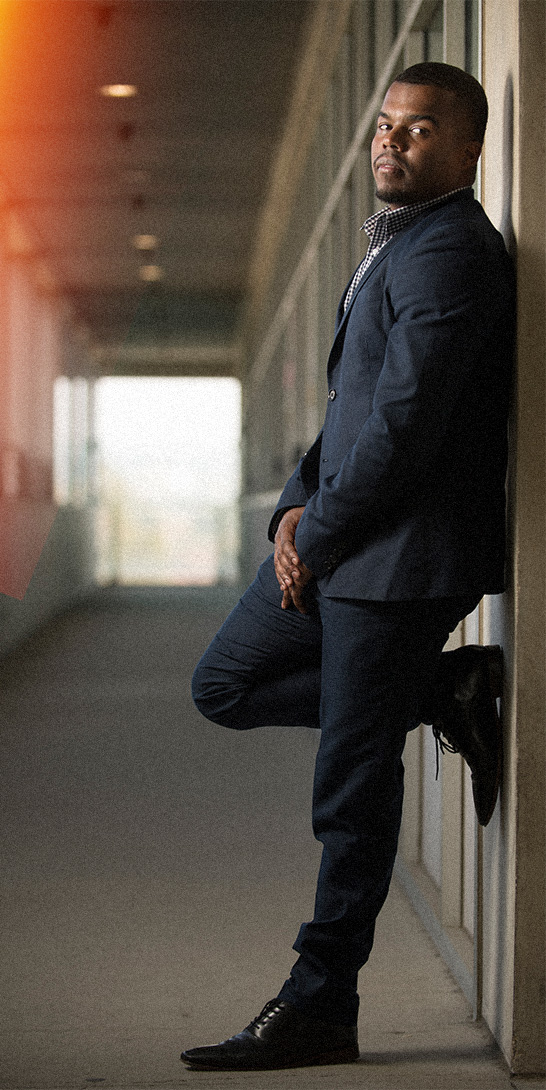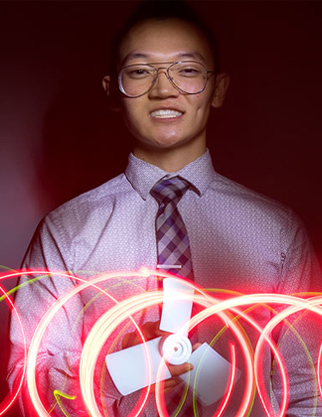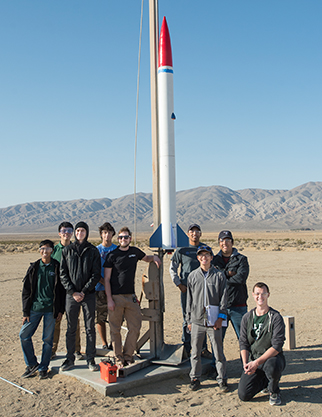Rhyme and Reason
Music Maker Steers Teens on the Right
Path by Sharing Personal Struggles
All the great fighters have one — a pre-bout ritual that prepares them to go the distance.
While Matt Bennett (’11, marketing management) is not a boxer, the inspirational speaker who gives talks at middle and high schools across the country is a fighter of another sort — one who battles for the souls of children. His weapon of choice is his personal story.
On the days he speaks, his ritual typically begins in the early morning, three or four hours before he takes the stage.
Bennett starts by reading a devotional and praying. He takes a three- to five-mile run through the town where he is speaking, getting a feel for places like Lansing, Michigan; Hopkinsville, Kentucky; and El Paso, Texas.
We’re not telling them it is going to get easier, but it’s going to get better if you work. I take ownership of my own success and education, and we’re equipping kids to do the same.”
“I speak in a lot of areas hardest hit by poverty, areas with high drug use and overdoses, areas with increased violence and suicides that are in desperate need of real hope,” Bennett says. “So every time that I speak, I live with the burden that a kid’s life could depend on the words that I share that day. I only have one shot to reach them, so I must be my best.”
While running, Bennett thinks about what he is most grateful for and the particular challenges the students might be facing. He visualizes himself on stage.
He warms up his vocal chords for at least 30 minutes. And then, dressed in a suit and tie, he stands on auditorium stages or holds center court in gymnasiums. He clasps a microphone, as teenagers clad in jeans and hooded sweatshirts sit rapt, and he tells his story of homelessness, struggling academically in high school and digging deep to become the first man in his family to earn a college degree.
“Keep going,” he tells students.
After an intense hourlong speech, he often spends three hours talking individually to teens, comforting those in tears and listening to their stories that mirror his own.
“You are in a battle for these kids’ lives,” he says of the experience. “You have to train. You have to stay in shape or you cannot do this work.”
The “Turn the Page” assembly Bennett gives aims to not only acknowledge the students’ trauma and pain, but also to encourage them to create new and fulfilling chapters in their lives.
“We’re equipping them to work despite what they are going through,” he says. “We’re not telling them it is going to get easier, but it’s going to get better if you work. I take ownership of my own success and education, and we’re equipping kids to do the same.”
Moving the Crowd
Before Bennett, 29, learned how to be the master of his own life, he tried and erred.
The Compton native grew up one of seven children, including a twin brother. When he was 5, he stood dumbstruck in his uncle’s driveway as a man in a ski mask and trench coat came out of the bushes and shot his father nine times. His dad survived.
“My sister kept saying ‘get down, get down,’” he says. “I was just frozen. I saw my dad lying in a pool of blood, while the shooter ran away and hopped in a waiting car never to be found.”
By age 11, his parents had split. The family fell on hard times and was forced to live in a rent-weekly motel.
“It was embarrassing,” he says. “All summer we were at different motels. I used to wait until 5 or 6 in the afternoon to go to the motel because I didn’t want friends to know I was homeless.”
The family bounced around so much that Bennett had attended seven schools by the time he finished middle school. At one time, he was one of nine living in a one-bedroom apartment, but the family managed.
He had always been a good student, but with all of the instability, he began to falter. While a freshman at Gardena High School, Bennett tried out for the track team. Although he made the roster, his 1.28 GPA precluded him from competing. Coach Michael Ramos made him the team manager, and Bennett had to watch from the sidelines.
“Coach Ramos said, ‘You are a student before you are an athlete. Good athletes put hard work in in the classroom first,’” Bennett says. “He opened my eyes, he taught me how to be a winner. You get out what you put in. I was putting in very little effort.”
Bennett went to work, even taking night and summer classes. By the time he crossed the stage to get his diploma, he had a 3.5 GPA.
One thing he loved to do was rap. His eldest sister rapped, and while he initially teased her about it, he soon fell in love with it too.
His eighth-grade history teacher was a rapper with an album and encouraged Bennett and others to try. When he got to Gardena High, Bennett recalls, he battled a guy in a freestyle circle. Others challenged him, but he kept winning.
Between sports and being able to rap, I found my outlet. I felt powerful with how people responded. The crowd will let you know if you have something or not.”
“Rap really helped me stay sane,” he says. “Between sports and being able to rap, I found my outlet. I felt powerful with how people responded. The crowd will let you know if you have something or not.”
His schoolmates teased him about how he dressed, the Vans he wore and called him “white boy.” The moniker stuck, and Bennett later produced and recorded three albums under the name Whyte Boy before reverting to his given name.
“It is me taking back my name, my identity,” he says. “I am embracing who I am.”
Ballad of a Grinder
Bennett would later bring his rapping skills to Cal Poly Pomona, writing his first album, “Nothing to Lose, Ballad of a Grinder,” selling it in the Bronco Bookstore, and performing twice at BroncoFusion. He continues to write, produce and record music as Matt Bennett, recently inking a deal for one of his songs “Whatever You Need” featuring Sammy Issac, to be used on the sitcom “New Girl.”
Rochelle Bennett says her younger brother always had a knack for finding great mentors who helped him see his potential. Besides being a natural storyteller and orator from the early days of summer camp, Bennett also had a mental toughness that carried him through difficult times, she adds. When he lost his two front teeth in a fall as a little boy, other children in their apartment complex teased him mercilessly, Rochelle recalls.
“He never gave in to that,” she says. “He was always wise beyond his years. His perspective is a huge part of the way he lives in the world. Matt had a way of looking at things differently, and he always had this fight in him. He also has this compassionate empathy with people, and it is good to see.”
Bennett didn’t know much about Cal Poly Pomona, but he recalled a middle school teacher who wore a sweater from the university. Growing up, he watched home and garden shows on television and found his attention drawn to a man on one program who remodeled houses. Bennett developed an interest in landscape architecture and decided that is what he wanted to study.
I just fell in love with the campus and the people,” he says. “I didn’t feel like just a number. It’s the best move I could have made.”
Still, becoming a Bronco was not a done deal. Bennett initially planned to head to Fresno State to play sports. He even had a friend who was to be his roommate, but participation in Cal Poly Pomona’s Residential Intensive Summer Education Program changed his course.
“I just fell in love with the campus and the people,” he says. “I didn’t feel like just a number. It’s the best move I could have made.”
Getting to Cal Poly Pomona wasn’t the end of a difficult road though.
Bennett, on his own for the first time, struggled financially. He initially thought he would pursue a degree in landscape architecture, but project materials were too costly. He got injured at one point and worked his way back to running track, only to drop it again so he could find a part-time job. When his car was impounded, he spent his rent money to get it back. He was homeless again. For an entire school year, he slept on friends’ couches and floors.
“It was one of the hardest times of my life, but it is where I grew the most,” he says. “I told myself that once I got to college, I wasn’t going to leave. I didn’t want to blow this opportunity. I didn’t want to let my little brothers down. It taught me grit and follow through.”
Bennett learned more than just his classroom lessons.
“College also taught me how to work hard over time to achieve multiple long-term goals, how to meet deadlines, how to manage my time, how to present myself professionally, how to network and maintain relationships with people, how to speak and write with precision,” he says. “Cal Poly Pomona’s ‘Learn by Doing’ philosophy taught me how to be an entrepreneur and self-starter despite all of the challenges I was facing. Plus, it helped me heal.”
Embracing Adversity
At Cal Poly Pomona, Bennett found a family away from his own, especially among the staff and faculty. When he thought he wasn’t going to make it that first year, they lifted him up.
Staffers came through with groceries. After losing his apartment, he received help with on-campus housing. A campus police officer once pulled him over, and after chatting for a while, gave him money to help him buy books.

He found a mentor in political science Professor Renford Reese, who first taught Bennett in 2009 and remembers him as a good, attentive student.
Reese recalls one day when he was chastising a student about wearing another university’s gear in his class, Bennett arrived late. Reese asked him why he was he tardy, and Bennett said it was because he was up late working on his album. Reese then had Bennett go out and walk back into the classroom to give a talk about his aspiring rap career and play one of the songs, “Higher.”
Bennett later taught courses in Reese’s Prison Education Project and traveled with Reese and other Cal Poly Pomona graduates to Uganda to start a similar program. Reese, who remains close to Bennett and talks to him weekly, says Bennett is an incredible storyteller and despite growing up in a neighborhood rife with gangs, he never lost his way.
“He’s articulate. He’s charismatic and he’s authentic,” Reese says. “When you are authentic, you really have a capacity to connect with people. He is not trying to be something he is not. If he lived in a car, he will tell you that he lived in a car.”
Bennett also worked on campus as a student ambassador and Poly Pathfinder for the Office of Admissions & Outreach. Deborah Brandon, executive director of admissions and enrollment planning, describes Bennett as a “man of God” who embraced adversity and always remained positive no matter the struggles.
When you are authentic, you really have a capacity to connect with people. He is not trying to be something he is not. If he lived in a car, he will tell you that he lived in a car.”
“He was a young man who was trying to find his voice and trying to find his passion for life,” she says. “He had this inner strength and perseverance that you rarely see in someone so young. He was always looking for opportunities where he could give back.”
After graduating in 2011, he worked a temporary job on campus as a recruiter, speaking to prospective Broncos at 100 schools in 90 days. During his campus visits, he spent 45 minutes sharing information about the university with prospective students and 15 telling his personal story. During the second round of visits a few months later, he was more intentional about sharing his own trials and successes.
After the temporary position ended, Bennett returned to his music and also did social work for the Los Angeles County Department of Social Services.
Finding Purpose
In 2010, he heard Manny Scott speak. Scott, an author and one of the original Freedom Writers whose story was told in a 2007 movie of the same name, was the founder of the education consulting firm Ink International.
It’s important to build loving relationships with them. People see me now and how well I am doing, but they don’t see the shoulders of the people I am standing on.”
“I walked up to him after and said, ‘Hey man, we’re supposed to work together,’” Bennett says.
So it felt sort of like kismet when a few years later, while Bennett was working for the county, he saw an ad on Facebook seeking potential speakers. Ink International, which does speeches at schools, conferences, prisons and youth summits, was hiring. The candidate pool started at 200, then was winnowed to 40, then seven. The company flew the finalists to Atlanta for interviews, and three were selected to join the team. Bennett made the cut. Today, of those three, he is the only one who remains. In 2017, he traveled to 40 states.
When Scott put out that ad, he needed help. The Long Beach native was spending 250 days a year on the road and was already booked two years out. He needed someone to help lighten his load. During the hiring process, Scott asked his most trusted advisors, including his wife, to give him feedback on Bennett.
“Matt was the only one everyone on my team approved of unanimously,” Scott says.
Scott says he was looking for a candidate who was competent to speak to diverse groups of people. He wanted someone committed to helping underperforming youth find their footing, a person who had character and with whom he had chemistry. Bennett has all of those qualities and more, he says.
“Matt has this likeability factor that you can’t really teach,” Scott says. “He came from the ’hood. He understands struggle. I needed someone who understood brokenness, poverty, death and really believing that you might not make it to your 18th birthday.”
Bennett, like Scott and many of those they try to reach, also knows great loss. In 2013, before Bennett began working at INK, his 23-year-old brother Iyshun Tornero Bennett was fatally shot at a neighbor’s barbecue when a stranger fired 39 rounds on the home with an AK-47 assault rifle. The murder remains unsolved.
“The loss of his brother could have destroyed him,” Scott says. “The stars aligned and our meeting was almost divinely designed to give him an opportunity to channel the pain into something constructive.”
not alone”
Reaching Back
At assemblies in both rural and urban communities across the country, Bennett talks to students about very difficult subjects, from economic struggles to depression to suicide.
For every suicide that is prevented, for every dropout that is prevented, for every student’s life that is changed, Cal Poly Pomona shares in this work.”
Bennett believes he connects with students because he genuinely cares about them and wants to see them thrive in the same way his former coaches, teachers and the Cal Poly Pomona community, in particular, poured love into him and invested time and energy into helping him succeed. This is his opportunity to pay it forward.
“We need more people to reach back for these kids,” he says. “It’s important to build loving relationships with them. People see me now and how well I am doing, but they don’t see the shoulders of the people I am standing on.”
No one makes it alone. And Bennett sees his time on campus as not only a place of growth for him, but a source of inspiration that provided him with the tools he needs to stay in the fight for young souls.
“For every suicide that is prevented, for every dropout that is prevented, for every student’s life that is changed, Cal Poly Pomona shares in this work because of the excellent foundation it set for me as an undergraduate student,” he says. “That prepared me for my purpose and this season of my life.”
Published May 17, 2018











